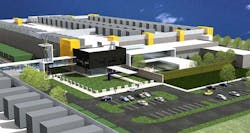What RagingWire’s 1 Million SF Data Center Tells Us About the Cloud
This week RagingWire Data Centers confirmed plans for a 1 million square foot data center campus in the Dallas data center market. The 80-megawatt project, built on a 42-acre plot in Garland, Texas, will effectively double RagingWire’s existing national footprint. The company’s operations are currently focused on campuses in Sacramento, Calif. and Ashburn, Virginia.
The RagingWire announcement reinforces a trend we’ve been highlighting here at Data Center Frontier – the super-sizing of the data center campus. The cloud builders are now focused on multi-building campuses that concentrate massive amounts of computing power in regional hubs offering economies of scale, enabling companies to rapidly add server capacity and electric power.
As IT operations push for better economics and speed-to-market, more capacity is shifting to cloud computing platforms, and the server farms and colocation facilities that house them. That makes it difficult to accurately predict how much data center space will be needed, and how soon. RagingWire, for example, says it is growing 25 percent a year.
Wanted: Longer Runways to Ramp Capacity
The solution: Build bigger. Find the very best places to build a data center, and acquire enough land to accommodate years of growth. The trend was visible across the globe this week:
- On Thursday, Apple gained approvals for the first phase of a $950 million data center campus in Galway, Ireland. The company envisions building as many as eight data center facilities at the site, providing capacity of up to 160 megawatts.
- Real estate sources in San Antonio reported Thursday that Microsoft is negotiating for up to 100 acres of land at a business park outside San Antonio, where the company already operates a 470,000 square foot cloud hub and has another large data center under construction. Interestingly, Microsoft is also reported to have leased a substantial chunk of wholesale space in the San Antonio market, suggesting the need for swing capacity to support growth between new builds.
The Dallas/Fort Worth market has been a favored location for cloud builders. Digital Realty operates one of the nation’s largest data center campuses in Richardson, which is home to several marquee cloud providers. In July Facebook broke ground on a planned 750,000 square foot campus in Fort Worth, which will be built out in three phases. This summer, Aligned Data Centers has begun construction on a 30-megawatt facility in Plano, while CyrusOne has added capacity within its 500,000 square foot powered shell in Carrollton. Meanwhile, Datacenter Hawk reports that Ascent Corp. is under contract to acquire land for a data center in the Dallas market.
Downtown Dallas is also benefiting, as T5 Data Centers has announced plans to convert a former hotel into a 300,000 square foot data center, and Equinix is making additional investment at the INFOMART.
Bigger in Texas
“The DFW data center market is unique because the barrier to entry is still low,” writes Datacenter Hawk. “Compared to other top data center markets (e.g. Chicago, New York City, Northern New Jersey, and Northern California), building and operating a data center in DFW typically costs less. DFW is a data center bull market for the foreseeable future.”
“We did a thorough evaluation,” said Doug Adams, Senior Vice President and Chief Revenue Officer of RagingWire. “With our site across the street from Richardson and just four miles from the Digital Realty campus, we are in an ideal location for businesses requiring a data center footprint in the middle of the United States.”
Building a 1 million square foot data center is a capital-intensive endeavor. RagingWire has access to the deeper pockets of global telco giant NTT Communications, which allows it to build big. Dallas apparently isn’t the end of the company’s ambitions, as RagingWire says its expansion may include “other top North American data center markets.”
For more insights on how cloud growth is shaping the location and size of data centers, watch for our first Data Center Frontier Executive Roundtable.
About the Author



